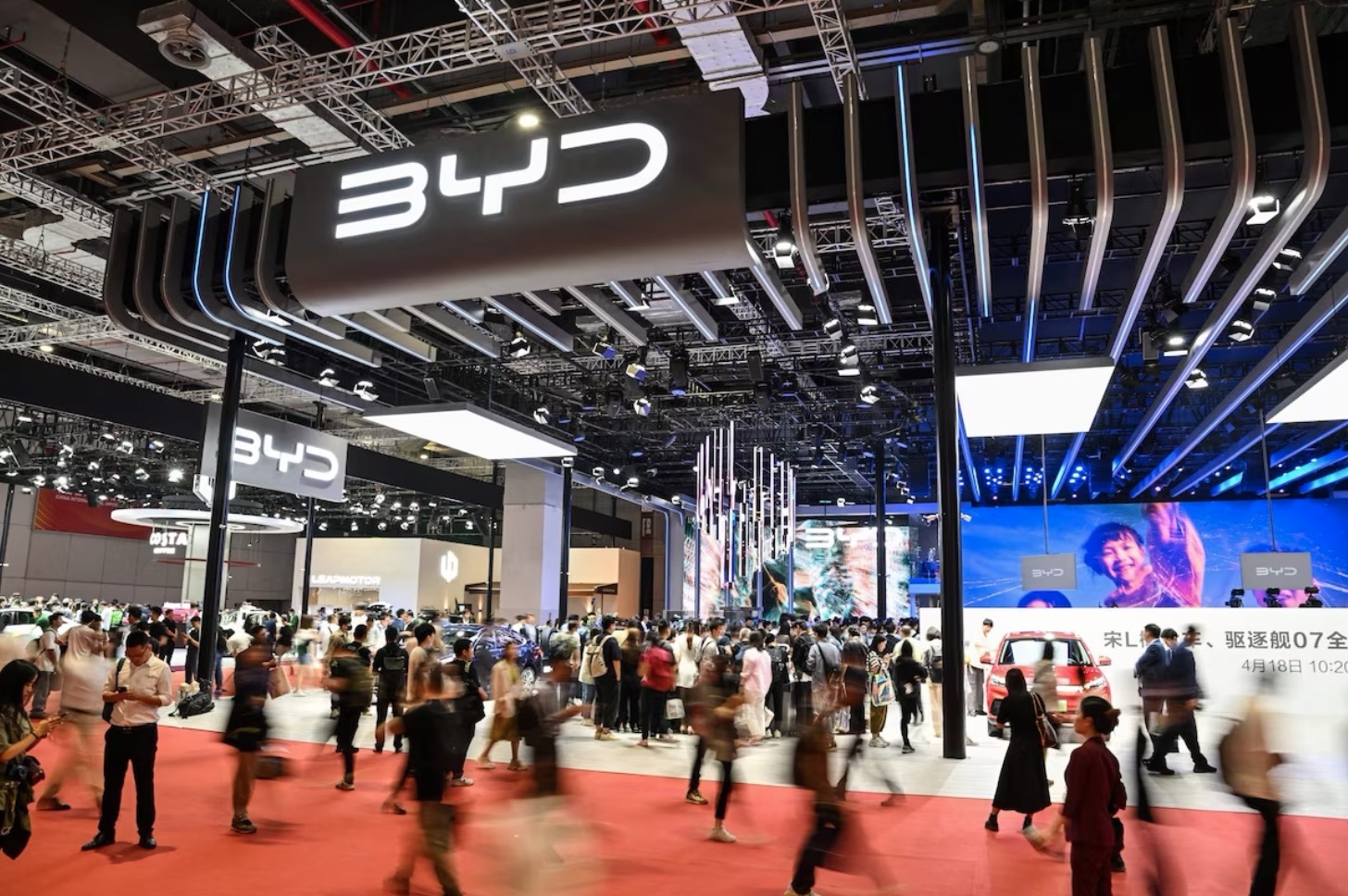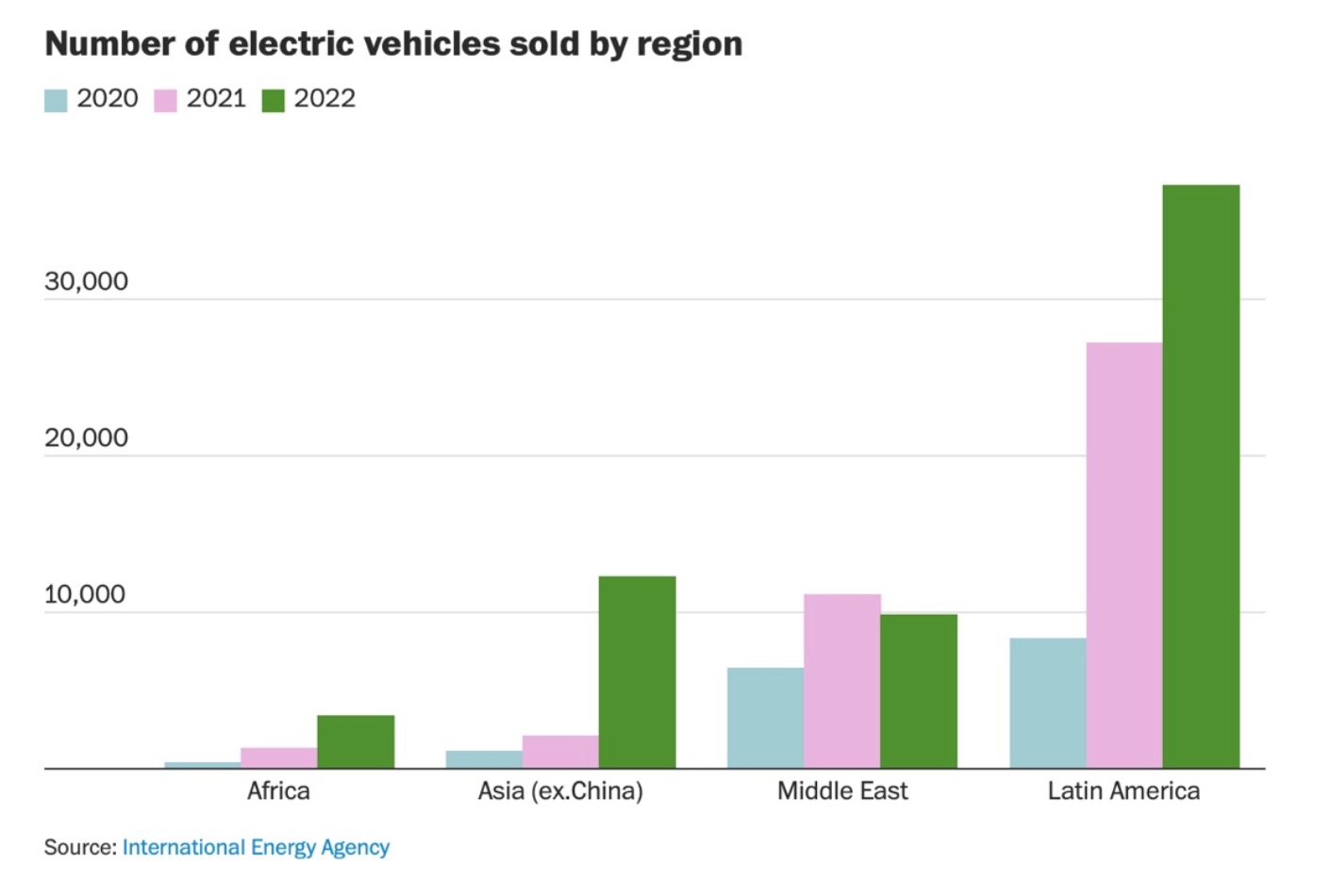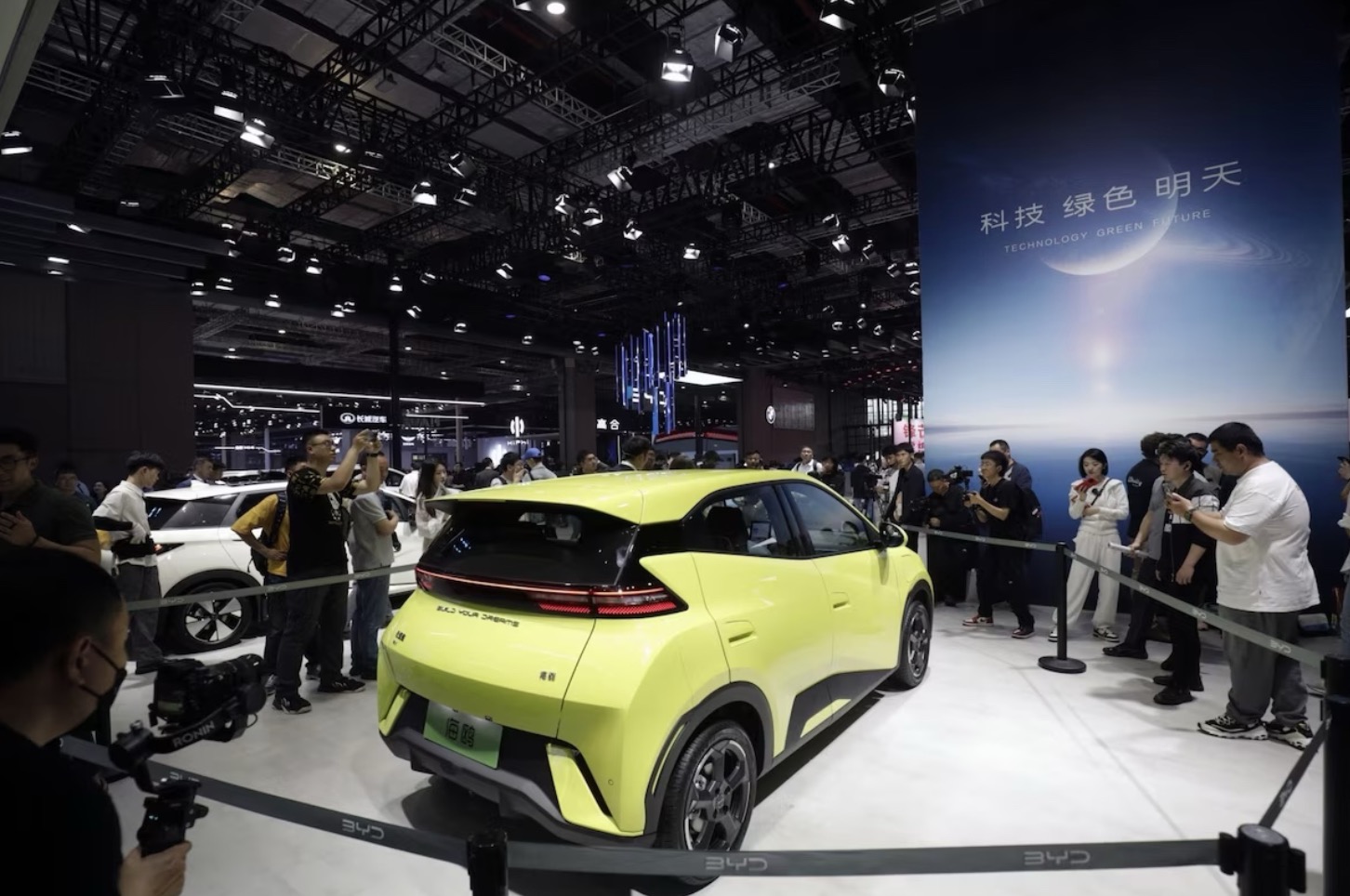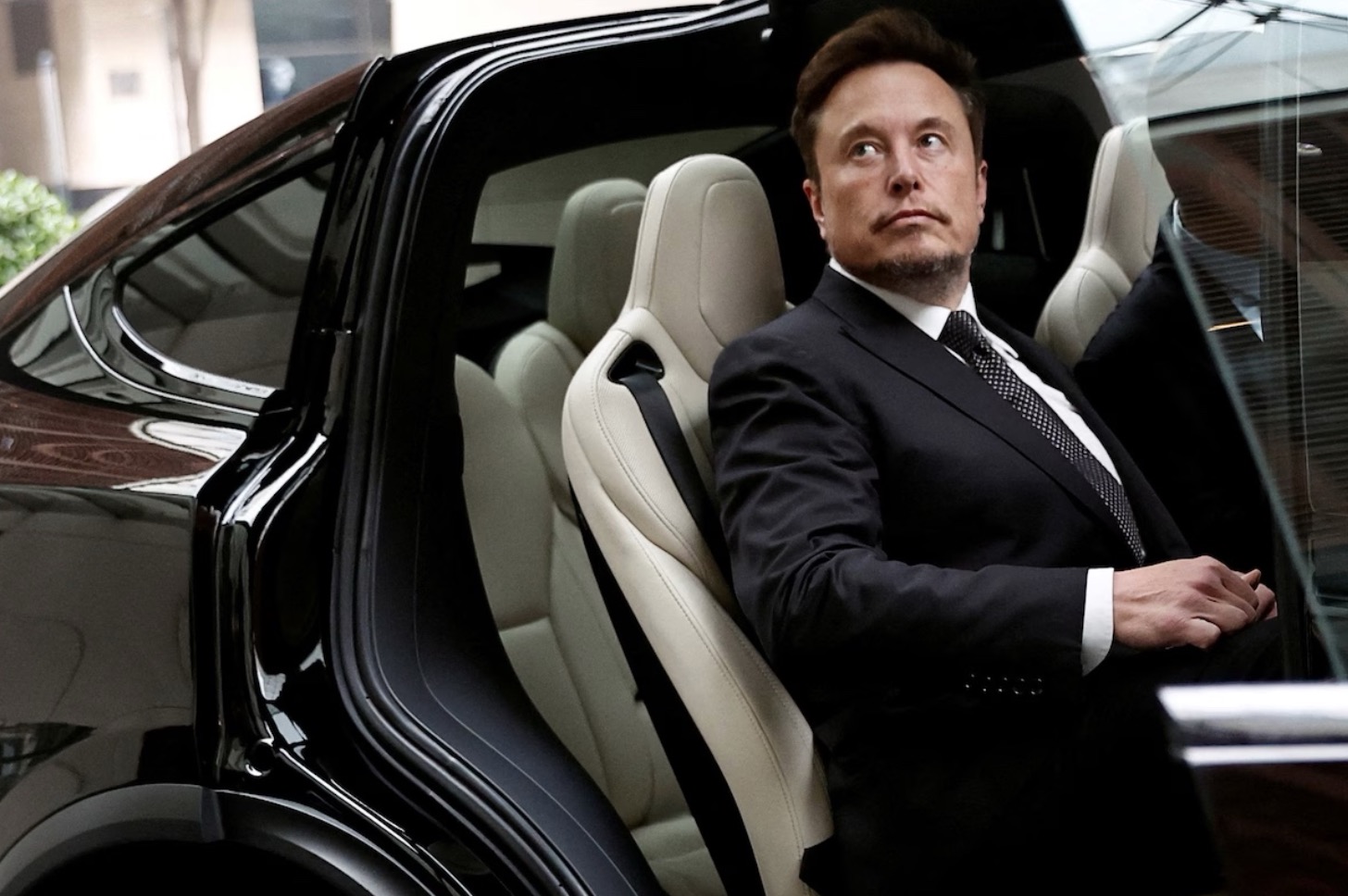19 Jun Washington Post Chinese : EV giant BYD overtakes Tesla, but can it crack the U.S. market?
Media Source : Washington Post Chinese
14 JUN 2023
By Meaghan Tobin and Lyric Li

People walk by a BYD stand at the 20th Shanghai International Automobile Industry Exhibition in April. BYD models are now the top-selling electric vehicles in Thailand, Israel, New Zealand and Singapore. (Hector Retamal/AFP/Getty Images)
Thai YouTube star Jo Chirawatt recently took two of the best-selling electric cars in Thailand for a test drive. One was Tesla’s Model 3. The other was the Atto 3, made by Chinese electric vehicle giant BYD.
The Atto 3 marked “the iPhone moment” for EVs, Chirawatt told his nearly 900,000 YouTube followers, suggesting it would set off a hype cycle that would transform a novelty purchase into a mainstream luxury. For most of the world, previous generations of EVs were aspirational purchases.
From Bangkok to Tel Aviv, BYD — which stands for “Build Your Dreams” — has been pushing to make EVs mass-market.
The Chinese car company, which has also sold low-priced gasoline-powered cars for more than a decade, has this year surpassed Tesla to become the top-selling EV brand in the world.
At the Shanghai auto show in April, the company’s biggest bid yet to capture the global market for affordable EVs was unveiled in the tiniest package, with the lowest price tag: a compact battery-powered hatchback called the Seagull that sells for just over $11,000.
“The Seagull was the shot heard around the world when it comes to affordability of electric vehicles,” said Bill Russo, founder and chief executive of the Shanghai-based advisory firm Automobility.
Would you buy a made-in-China electric car? They’re coming.
This year has marked a moment of arrival not just for BYD but for the much-maligned Chinese auto sector as a whole.
The country exported 1.07 million cars in the first quarter of this year, according to China’s Association of Automobile Manufacturers — overtaking Japan to become the world’s top auto exporter.
One out of every four of those cars was electric. BYD models are now the top-selling electric vehicles in Thailand, Israel, New Zealand and Singapore.
Like many Chinese tech companies before it, BYD has targeted fast-growing emerging markets without strong local brands. It did the same with its earlier gas-powered cars, selling across South America, Africa and the Middle East.
Now, BYD is racing to get drivers in these same markets into their first EV — building its dream almost everywhere, except the United States.
In Thailand, the Atto 3 accounted for nearly 40 percent of the local EV market in the first quarter of this year. Now, BYD has its sights on becoming one of the top sellers of EVs in India, where it has an assembly plant.
“If Tesla decides to enter a market in Latin America or Southeast Asia, guess who they’re going to have to compete against in every single one of those markets?” said Tu Le, founder of the Beijing-based consultancy Sino Auto Insights. “That’s an advantage to BYD.”


But being a newcomer has drawbacks. In target markets like Australia, people on social media question the longevity and long-term reliability of the low-priced models. In 2022 J.D. Power surveys, BYD lagged its foreign rivals on multiple metrics, including dependability and performance.
And BYD didn’t grow on its own. Over more than a decade, the company has received billions of dollars in support from the Chinese government.
Cutthroat competition, state support power China’s electric car revolution
The EV industry has long been a priority for Beijing, which sought to curb China’s reliance on fossil fuels and foreign automakers by supporting domestic firms’ mastery over every part of the EV supply chain.
By 2018, the Chinese government had spent nearly $60 billion on achieving the transition to “new-energy vehicles,” according to the Center for Strategic and International Studies in Washington.
As China became the dominant processor for the essential minerals that go into EV batteries — 95 percent of the manganese and over 60 percent of the cobalt and lithium is processed in China — Chinese EV and battery makers like BYD benefited from government grants, subsidies and tax credits.

BYD’s battery-powered Seagull is shown at the Shanghai auto show. The compact car sells for just over $11,000. (Qilai Shen/Bloomberg)
These incentives sparked the growth of dozens of EV companies in China, all vying for the top spot in the market. The battle has been so fierce that Tesla has repeatedly cut prices. Analysts predict that BYD’s Seagull will bring this cutthroat competition to markets around the world.
Tesla CEO Elon Musk “likes to think he can make the EV affordable for everyone — he’s been talking about a $25,000 electric vehicle for years, but he doesn’t have one right now,” said Russo, of Automobility.
“BYD has an $11,000 electric vehicle, and it will be available this year. If anyone is democratizing the EV, it’s Wang Chuanfu, and he’s the one who should be called the Henry Ford of the 21st century.”
Wang, a chemist, founded BYD in 1995 to make batteries for early laptops and cellphones like the Motorola Razr. Twenty years ago, Wang bought a failed car company with the idea of making batteries for those, too.
Analysts have described Wang as just as relentless and ambitious as Musk. During a factory tour in 2008, according to Fortune magazine, Wang told David Sokol, an executive at Warren Buffett’s investment firm Berkshire Hathaway, that in an effort to make recyclable batteries, BYD had developed nontoxic battery fluid.
Then, to prove it, Wang poured it into a glass — and drank it. Sokol didn’t partake. But a few months later, Buffett invested $230 million.

Tesla CEO Elon Musk in Beijing in May. When asked to name Tesla’s biggest competition during an earnings call earlier this year, Musk answered, “Some company out of China.” (Tingshu Wang/Reuters)
At Tesla, Musk focused on making EVs into a flashy aspirational purchase. But at BYD, Wang doubled down on the company’s battery technology. He insisted that BYD’s batteries had become so efficient that if the cars didn’t work out, the company could make batteries for competitors. Today, BYD sells its batteries to both Tesla and Ford.
“BYD has always built its own chips and made its own batteries and engineered them themselves,” said Le, of Sino Auto Insights.
All of Tesla’s big announcements revolve around the company taking ownership of the engineering of some component, Le said. “In effect, they’re saying they want to be BYD.”
When asked to name Tesla’s biggest competition during an earnings call earlier this year, Musk answered, “Some company out of China.”
Buffett’s longtime business partner Charlie Munger said in February that BYD was “so far ahead of Tesla … it’s ridiculous.”
Tesla ignited a wave of interest in EVs in China in 2019 when it opened its Shanghai Gigafactory, intensifying competition among dozens of Chinese EV companies as sales surpassed government targets.
During the pandemic, while most of the world’s automakers faced major supply-chain disruptions, BYD and Tesla were able to keep exporting. Last year, more than a third of the world’s EVs were exported from China, up from one-quarter the year before, according to the International Energy Agency.
Would you buy a made-in-China electric car? They’re coming.
As tensions between Beijing and Washington increase and both sides move to shore up the growth of their domestic tech industries, Chinese-made EVs face multiple hurdles getting into the U.S. market. These include high import tariffs and a tax credit up to $7,500 for drivers who buy an EV that was assembled in North America.
On a recent earnings call, Wang said the company’s expansion strategy, for now, required avoiding “automobile powerhouse countries” like the United States, Germany, Japan and South Korea, where the “political risks are relatively high.”
Analysts say the high tariffs won’t keep Chinese brands out of the U.S. market for long. Tesla announced in March that it would open its next Gigafactory in Mexico, and Chinese EV makers could follow, potentially circumventing U.S. curbs on Chinese imports by manufacturing in North America.
“From the beginning, the Chinese automakers all wanted to go to the U.S., but they found it was difficult,” said Steven Dyer, a former Ford executive and managing director at the Shanghai-based consultancy AlixPartners. “Eventually, you’ll see a lot of Chinese-brand vehicles in the U.S., it’s just a matter of time — but they’ll go where it’s easier first.”
SOURCE: https://www.washingtonpost.com/world/2023/06/13/china-byd-electric-vehicle-tesla-rival/



Sorry, the comment form is closed at this time.